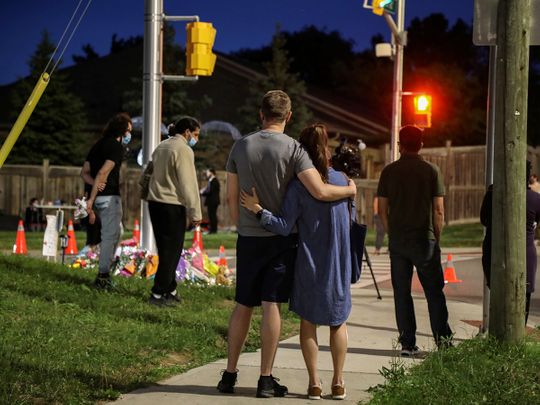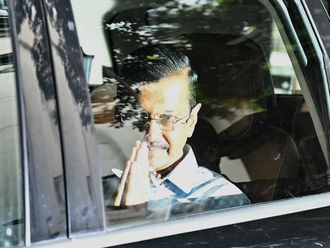
A Muslim family of four, spanning three generations, while going for an evening walk, was deliberately run over and killed by a 20-year-old White supremacist driving a pickup truck in Ontario, Canada, on June 7, 2021.
This horrific terror act has been condemned by politicians from all the Canadian political parties, and thousands of Canadians are marching in support of the Muslim Pakistani-Canadian family.
Islamophobia leading to the rise of hate crimes is not a new phenomenon. The West has witnessed this rise, at least for the last two decades, since 11 September 2001.
The outrage over the death of this innocent Muslim family will soon come to an end, and the politics of populism will carry on as usual. Islamophobia-induced terror acts are neither new to Canada nor the rest part of the world.
In Canada itself, the Quebec Mosque shooting had killed six people in 2017. A white supremacist in Christchurch, New Zealand, had murdered 51 worshippers at two mosques in 2018.
In Hanau, Germany, a far-right gunman had killed nine and wounded five, targeting Muslims in two shisha bars in 2020. These horrific attacks led to a few days of the show of concern by political leaders and media. Still, soon the political discourse and policymaking returned to ‘business as usual’.
Islamophobia manifests in different forms. Broadly, anti-Muslim activities can be boxed in three types: individual, political, and institutional levels, but they all have cascading effects on each other. At the individual level, Islamophobia expresses itself in harassment and violence against Muslims.
Mobilisation against minority rights
At the political level, Islamophobia leads to mobilisation against minority rights of Muslims, accepting refugees or immigrants from the Islamic faith, or even opposition to the construction of mosques.
As long as Islamophobia is confined to individual criminal acts or being used as a far-right political mobilisation technique, Muslims as a minority population in a country can still receive the state protection to follow their faith without fear.
However, the real worry is Islamophobia is fast becoming institutionalised in many countries, particularly with populism and nationalism on the rise. Islamophobic legislation regulating religious dress to laws banning public worship and other forms of religious restrictions have in recent years become more common.
Trump administration had barred entry to the US from several Muslim majority countries. At least ten EU member states have passed laws against religious dress traditionally worn by many Muslim women. In the 2015 election in Canada, Stephen Harper had even promised to consider banning wearing niqab for those who are in the public service.
In Myanmar, law does not recognise Rohingya Muslims as one of its legally recognised ethnic groups, denying them citizenship. India has passed a law to give citizenship to anyone except Muslims from some countries in South Asia.
Subject to surveillance
Even if the laws in some countries are not explicitly discriminatory, minority Muslims are usually treated severely by the police and more likely to receive jail sentences by the legal systems as compared to members of other religious groups. Security agencies in many countries target Muslims for surveillance and subject them to racial and religious profiling.
Over and above, the dominant media discourse, particularly in the West, has a strong anti-Muslim bias, and the media portrayals of Muslims perpetuate the negative stereotype.
The institutional form of Islamophobia, such as Islamophobic legislation, unfair treatment in the legal system, and media bias, has brought helplessness among Muslim minorities and legitimises and reinforces individual and political manifestation of anti-Muslim activities.
The ever-growing populist regimes continue to protect and justify Islamophobic acts, speeches, and ideologies of individuals and political groups in the name of protecting democracy, freedom of expression, and the rule of law. Anti-Muslim xenophobia is tolerated not only by the states ruled by populists but also being normalised, reducing Muslims as second-class citizens in many countries.
Islamophobia is a serious issue, which is not confined to one country alone. With the rise of populism and nationalism, it has become a global curse. Thus, the outrage should not be focused on only one country or one individual act. Islamophobia can’t also simply be attributed to one religious or racial group.
Muslims are as much as a target of White supremacists in the West as they have been victims of extreme right votaries of Hindutva in India, nationalist Buddhists in Myanmar, majoritarian Christians in the Philippines, and far-right Jews in Israel.
The new 'anti-Semitism'
In the early 20th Century, anti-Semitism had become a state policy in Europe by bringing a distinction between ‘good anti-Semitism’ and ‘bad anti-Semitism’. The ‘good anti-Semitism’ was taking actions against so-called Jewish control over wealth and media, and the ‘bad anti-Semitism’ was an open display of hatred towards Jews. The world has witnessed the horrific consequences of that policy.
Similarly, Islamophobia is now being legitimised, and hate crimes against Muslims are becoming normal in many societies, as populist regimes project their laws banning Islamic dresses or denying citizenship to Muslims as ‘good Islamophobia’.
There is nothing good in any bigotry. The world must wake up to stop the populists from enacting Islamophobic laws on the pretext of doing good for the country and society.
The horrific killing of a Muslim family in Canada is just a symptom, and the disease is the populism providing state legitimacy to Islamophobia. There is very little to gain even if you want to treat the symptom but overlook the underlying disease.







_resources1_16a45059ca3_small.jpg)

